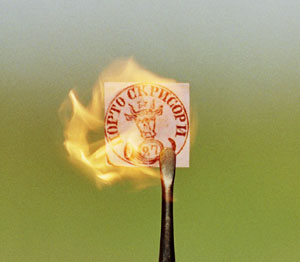Stills

Short film / Romania / 2006 / 39 min / colour / Romanian, German, French, with English subtitles
Director: Lucian Pintilie
Victor Rebengiuc, Tudor Aron Istodor, Sorin Leoveanu
The Ukrainian steppe, towards the end of the Second World War. The German and Romanian troops are withdrawing. In a deserted school where a Romanian military unit has its headquarters, a visit from two high-ranking German officers is announced. They are there just for a meal and some company. Warmed up by champagne, the German major astonishes his hosts by showing off the most expensive stamp in the world, the famous Aurochs Head. But going round the table, the stamp disappears...
View the full script here (Romanian only).
“Tertium Non Datur is a tragicomic parable about the integration of the poorest of the poor, ridden by complexes, into the fiction which we provisionally call Europe.”
Born in 1933 in Tarutino, Romania (now Ukraine). Graduated from the Institute of Theatre and Cinema, Bucharest, in 1956. One of the most influential Romanian directors, Lucian Pintilie worked in theatre, opera, television and film. Pintilie had an uneasy relationship with the Communist regime: his second film, Reenactment, was banned shortly after its release in 1968; in 1972, after a series of warnings, his theatre show The Inspector General (Gogol) was banned as well; his third film, Carnival Scenes (1981) was only screened in public only after the change of political regime in Romania in 1989. From the 1970s on, Lucian Pintilie has lived between Romania and France. On his return to Romania in the early 1990s, he produced some of the most memorable Romanian films.
2006: Tertium Non Datur; short film, 23 min, colour – director, screenwriter
2003: Niki & Flo; feature film, 95 min, colour – director
2001: Afternoon of a Torturer, feature film, 76 min, colour – director, screenwriter
1998: Last Stop Paradise; feature film, 108 min, colour – director, screenwriter
1996: Too Late; feature film, 104 min, colour – director, screenwriter
1994: Unforgettable Summer; feature film, 82 min, colour – director, screenwriter
1992: The Oak; feature film, 105 min, colour – director, screenwriter, producer
1981: Carnival Scenes; feature film, 132 min, colour – director, screenwriter
1973: Ward Six; feature film, 92 min, colour – director
1968: The Reenactment; feature film, 106 min, b/w – director, screenwriter
1965: Sunday at Six; feature film, 83 min, b/w – director
Eastern European cinema used to have a passion for history and a predisposition to focus on the moral choices left to the individual placed in complex historical circumstances. This is also the domain of Tertium Non Datur, the only film in this programme signed by a senior filmmaker.
The film was inspired by a short story written by Romanian writer Vasile Voiculescu in 1945, immediately after the advent of communism in Romania, when it became clear that there was little room left for him in the new world. Voiculescu’s piece was meant as a political allegory about survival in communism, when collaborationism or abandonment appeared like the only two options left to the individual by the new political rule.
Tertium Non Datur begins from Voiculescu and ends up as 100% Pintilie. In a sober, almost theatrical style, Pintilie comes up with a tragicomic parable about fate and coincidence, identity and pride, onto which he projects his usual gusto for larger meanings. His film touches on national identity at a time when the national paradigm has become slightly passé under pressure from larger, supra-national paradigms. What could one make today of the intersection of the ‘national’ with the ‘individual’ identity? And is it really outdated to talk about honour at the beginning of the 21st Century?
His love for, and exasperation with, his own country have always been central ingredients of Pintilie’s work. They still are, and the way in which he negotiates between the ironical, the tragic and the grotesque is as memorable as ever. After all, Pintilie is the filmmaker whose main character in The Oak (1992) wished his unborn child to be an idiot or a genius, rather than ‘normal’ in the fashion of the day. Remember that when you hear another ‘enormous’ statement in this film. And listen to Ada Milea on the soundtrack. (A.B.)
